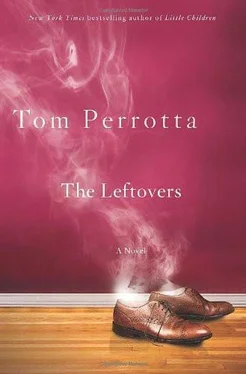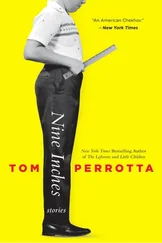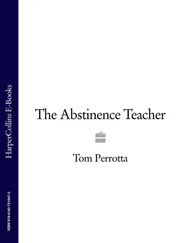Tom Perrotta - The Leftovers
Здесь есть возможность читать онлайн «Tom Perrotta - The Leftovers» весь текст электронной книги совершенно бесплатно (целиком полную версию без сокращений). В некоторых случаях можно слушать аудио, скачать через торрент в формате fb2 и присутствует краткое содержание. Год выпуска: 2011, ISBN: 2011, Жанр: Социально-психологическая фантастика, на английском языке. Описание произведения, (предисловие) а так же отзывы посетителей доступны на портале библиотеки ЛибКат.
- Название:The Leftovers
- Автор:
- Жанр:
- Год:2011
- ISBN:978-0-312-35834-1
- Рейтинг книги:3 / 5. Голосов: 1
-
Избранное:Добавить в избранное
- Отзывы:
-
Ваша оценка:
- 60
- 1
- 2
- 3
- 4
- 5
The Leftovers: краткое содержание, описание и аннотация
Предлагаем к чтению аннотацию, описание, краткое содержание или предисловие (зависит от того, что написал сам автор книги «The Leftovers»). Если вы не нашли необходимую информацию о книге — напишите в комментариях, мы постараемся отыскать её.
The Leftovers — читать онлайн бесплатно полную книгу (весь текст) целиком
Ниже представлен текст книги, разбитый по страницам. Система сохранения места последней прочитанной страницы, позволяет с удобством читать онлайн бесплатно книгу «The Leftovers», без необходимости каждый раз заново искать на чём Вы остановились. Поставьте закладку, и сможете в любой момент перейти на страницу, на которой закончили чтение.
Интервал:
Закладка:
“What about you?” Kevin would ask, not the least bit self-conscious in his spandex pants, his face glowing with good health and a thin layer of perspiration. “What’d you do all day?”
“Me? I helped Rosalie with her scrapbook.”
He made a face, disapproval mingled with forbearance.
“She’s still doing that?”
“She doesn’t want to finish. Today we did a little history of Jen’s swimming career. You could watch her grow up year by year, her body changing inside that blue bathing suit. Just heartbreaking.”
“Huh.” Kevin filled his glass with ice water from the built-in dispenser on the fridge. She could tell he wasn’t listening, knew that he’d lost interest in the subject of Jen Sussman months ago. “What’s for dinner?”
LAURIE COULDN’T say that she was shocked when Rosalie announced that she was joining the Guilty Remnant. Rosalie had been fascinated by the people in white since the first time she saw them, frequently wondering out loud how hard it would be to keep a vow of silence, especially if you happened to bump into an old friend, someone you hadn’t seen in a long time.
“They’d have to give you some leeway in a case like that, don’t you think?”
“I don’t know,” Laurie said. “I kind of doubt it. They’re fanatics. They don’t like to make exceptions.”
“Not even if it was your own brother, and you hadn’t seen him for twenty years? You wouldn’t even be able to say hi?”
“Don’t ask me. Ask them.”
“How can I ask them? They’re not allowed to talk.”
“I don’t know. Check the website.”
Rosalie checked the website a lot that winter. She developed a close I.M. friendship — evidently, the vow of silence didn’t extend to electronic communications — with the Director of Public Outreach, a nice woman who answered all her questions and walked her through her doubts and reservations.
“Her name’s Connie. She used to be a dermatologist.”
“Really?”
“She sold her practice and donated the proceeds to the organization. That’s what a lot of people do. It’s not cheap to keep an operation like that afloat.”
Laurie had read an article about the Guilty Remnant in the local paper, so she knew that there were at least sixty people living in their “compound” on Ginkgo Street, an eight-house subdivision that had been deeded to the organization by the developer, a wealthy man named Troy Vincent, who was now living there as an ordinary member, with no special privileges.
“What about you?” Laurie asked. “You gonna sell the house?”
“Not right away. There’s a six-month trial period. I don’t have to make any decisions until then.”
“That’s smart.”
Rosalie shook her head, as if amazed by her own boldness. Laurie could see how excited she was now that she’d made the decision to change her life.
“It’s gonna be weird, wearing white clothes all the time. I kind of wish it was blue or gray or something. I don’t look good in white.”
“I just can’t believe you’re gonna start smoking.”
“Ugh.” Rosalie grimaced. She was one of those hard-line nonsmokers, the kind of person who waved her hand frantically in front of her face whenever she got within twenty feet of a lit cigarette. “That’s gonna take some getting used to. But it’s like a sacrament, you know? You have to do it. You don’t have a choice.”
“Your poor lungs.”
“We’re not gonna live long enough to get cancer. The Bible says there’s just seven years of Tribulation after the Rapture.”
“But it wasn’t the Rapture,” Laurie said, as much to herself as to her friend. “Not really.”
“You should come with me.” Rosalie’s voice was soft and serious. “Maybe we could be roommates or something.”
“I can’t,” Laurie told her. “I can’t leave my family.”
Family: She felt bad even saying the word out loud. Rosalie had no family to speak of. She’d been divorced for years and Jen was her only child. She had a mother and stepfather in Michigan, and a sister in Minneapolis, but she didn’t talk to them much.
“That’s what I figured.” Rosalie gave a small shrug of resignation. “Just thought I’d give it a try.”
*
A WEEK later, Laurie drove Rosalie to Ginkgo Street. It was a beautiful day, full of sunshine and birdsong. The houses looked imposing — sprawling three-story colonials with half-acre lots that probably would have sold for a million dollars or more when they were built.
“Wow,” she said. “Pretty swanky.”
“I know.” Rosalie smiled nervously. She was dressed in white and carrying a small suitcase containing mostly underwear and toiletries, plus the scrapbooks she’d spent so much time on. “I can’t believe I’m doing this.”
“If you don’t like it, just give me a call. I’ll come get you.”
“I think I’ll be okay.”
They walked up the steps of a white house with the word HEADQUARTERS painted over the front door. Laurie wasn’t allowed to enter the building, so she hugged her friend goodbye on the stoop, and then watched as Rosalie was led inside by a woman with a pale, kindly face who may or may not have been Connie, the former dermatologist.
Almost a year passed before Laurie returned to Ginkgo Street. It was another spring day, a little cooler, not quite as sunny. This time she was the one dressed in white, carrying a small suitcase. It wasn’t very heavy, just underwear, a toothbrush, and an album containing carefully chosen photographs of her family, a short visual history of the people she loved and was leaving behind.
Part One. THREE-YEAR ANNIVERSARY
HEROES’ DAY
IT WAS A GOOD DAY for a parade, sunny and unseasonably warm, the sky a Sunday school cartoon of heaven. Not too long ago, people would have felt the need to make a nervous crack about weather like this— Hey, they’d say, maybe this global warming isn’t such a bad thing after all! — but these days no one bothered much about the hole in the ozone layer or the pathos of a world without polar bears. It seemed almost funny in retrospect, all that energy wasted fretting about something so remote and uncertain, an ecological disaster that might or might not come to pass somewhere way off in the distant future, long after you and your children and your children’s children had lived out your allotted time on earth and gone to wherever it was you went when it was all over.
Despite the anxiety that had dogged him all morning, Mayor Kevin Garvey found himself gripped by an unexpected mood of nostalgia as he walked down Washington Boulevard toward the high school parking lot, where the marchers had been told to assemble. It was half an hour before showtime, the floats lined up and ready to roll, the marching band girding itself for battle, peppering the air with a discordant overture of bleats and toots and halfhearted drumrolls. Kevin had been born and raised in Mapleton, and he couldn’t help thinking about Fourth of July parades back when everything still made sense, half the town lined up along Main Street while the other half — Little Leaguers, scouts of both genders, gimpy Veterans of Foreign Wars trailed by the Ladies Auxiliary — strode down the middle of the road, waving to the spectators as if surprised to see them there, as if this were some kind of kooky coincidence rather than a national holiday. In Kevin’s memory, at least, it all seemed impossibly loud and hectic and innocent — fire trucks, tubas, Irish step dancers, baton twirlers in sequined costumes, one year even a squadron of fez-bedecked Shriners scooting around in those hilarious midget cars. Afterward there were softball games and cookouts, a sequence of comforting rituals culminating in the big fireworks display over Fielding Lake, hundreds of rapt faces turned skyward, oohing and wowing at the sizzling pinwheels and slow-blooming starbursts that lit up the darkness, reminding everyone of who they were and where they belonged and why it was all good.
Читать дальшеИнтервал:
Закладка:
Похожие книги на «The Leftovers»
Представляем Вашему вниманию похожие книги на «The Leftovers» списком для выбора. Мы отобрали схожую по названию и смыслу литературу в надежде предоставить читателям больше вариантов отыскать новые, интересные, ещё непрочитанные произведения.
Обсуждение, отзывы о книге «The Leftovers» и просто собственные мнения читателей. Оставьте ваши комментарии, напишите, что Вы думаете о произведении, его смысле или главных героях. Укажите что конкретно понравилось, а что нет, и почему Вы так считаете.












